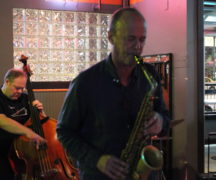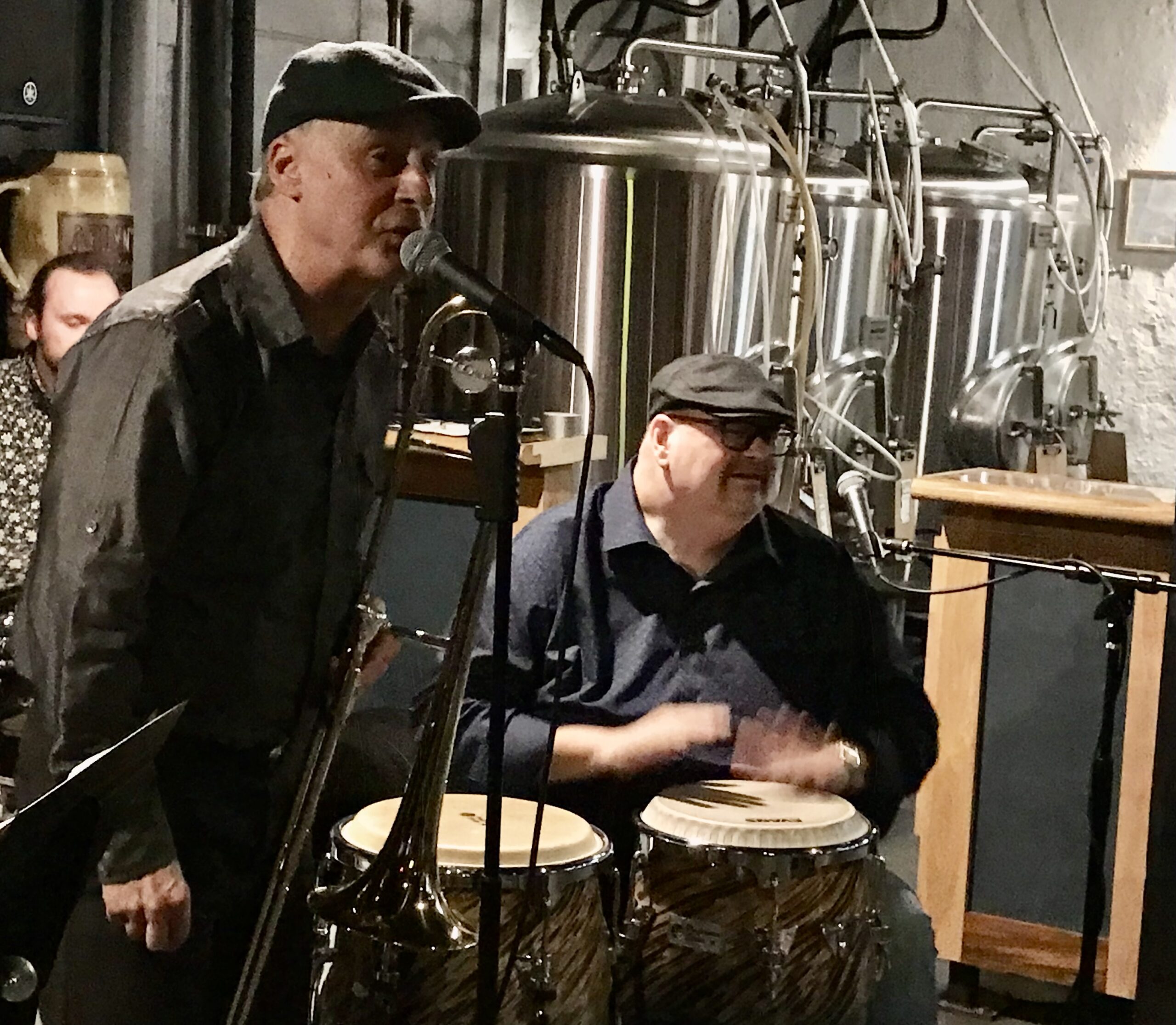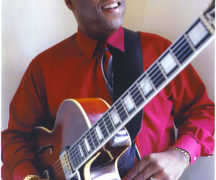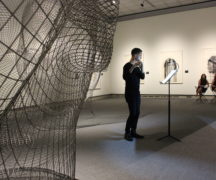By DAVID DUPONT
BG Independent News
Jazz performance comes down to conversation.
On the stage that means the bass player communicating with the drummer, and both communicating with the saxophonist, explained award-winning bassist and composer Robert Hurst. Off the stand it means listening to records together, and talking about the music.
When he traveled with singer Dianne Krall’s band, the musicians would take turns assembling playlists to listen to during long bus trips.
It’s about the hang, said Jeff Halsey, the director of Jazz Studies at Bowling Green State University.
Hurst, who has played with a who’s who of the jazz world, in the Tonight Show Band and composed for movies, was on campus last week. He performed with the university’s top student big band, and then on Friday held a master class with a couple student jazz combos.
Communication also means being clear with yourself, Hurst, 51, said. “Two things I try to ask myself,” he said: “How can I make this groove better? … Are you being a drag?”
That applies not just to the bandstand, he said, but life in general.
Hurst carries his prominence lightly, not afraid to crack a joke.
When saxophonist David Mirarchi said the trio was going to play the standard tune “I Hear a Rhapsody,” Hurst came back at him with “I hear a Rap CD?”
He praised the group he heard, but also offered some advice based on his decades as a musician.
A solo, he said, should have a theme, a rhythmic fragment or motif. His approach is to work with whatever he plays first in a solo.
He also told the young musicians not to worry about being intimidated on the stand. “You have to get used to the feeling of being uncomfortable,” he said.
“If you’re going to play this music at a high level, you’ve got to have trust.”
When the Detroit native first hit the international scene with the Wynton Marsalis band in 1986, he felt he was the worst one in the band. “I didn’t mind that.”
He admitted that he still makes mistakes like at the concert the night before when there was some miscommunication about the bridge on one of the tunes.
It’s music, he said. Nobody’s going to die if you make a mistake.
Not that anyone in the audience for the Thursday night show was complaining. With a single rehearsal together, the bassist and band established an easy camaraderie.
The program listed six tunes and stated: “Program will be selected from the following.” In the end the band whipped through them all in a fashion that belied a scant two weeks of preparation.
Hurst is a veteran educator as well as performer. He teaches at the University of Michigan in Ann Arbor, a job that brought him back to his roots.
He grew up with a music loving father, who had a great record collection. Hurst’s father was boyhood friends with two of The Temptations.
As a youngster Hurst was enamored with the Jackson 5 and the Motown sound. One Christmas he and his cousins all got guitars. Though he’d had a few piano lessons, that’s what really got him into music.
He started taking guitar lessons. When he broke the two high strings on his instrument, he was left with essentially a bass guitar tuned an octave higher.
Hurst said he’d already been picking out the bass lines he heard on records. He loved the grooves he heard on those Motown records. This being Detroit, the radio stations played more than the Motown hits. They played the B sides; they played the entire album.
“The bass called me,” Hurst said in an interview after the master class.
Later his family moved to Grand Rapids, Michigan, where he started playing acoustic bass.
By the time he was 15, he was gigging with Detroit jazz legend trumpeter Marcus Belgrave.
Halsey, who was working on the Detroit jazz scene at the time, remembers young Hurst made quite a splash and had the musical community humming.
Detroit, Hurst said, continues to have its own sound.
When music and the arts got cut from schools, musicians turned to hip hop and electronics. Now he notices more and more instrumentalists are coming out of the church, a throwback to earlier days.
Hurst is a strong proponent of jazz education at the college level. His own education gave him the musical grounding he’s needed to play and write in all musical situations.
Knowing jazz doesn’t mean musicians can automatically play rhythm ‘n’ blues, he said, but it gives them the tools to study and learn that style. “The knowledge of jazz far surpasses what you need to play R&B.”
That musical grounding has helped Hurst both as a featured player on the soundtracks for the “Oceans 11,” “Oceans 12” “Oceans 13” and “Good Night, and Good Luck” and as a composer of his own film and TV music.
When he was with the “Tonight Show” band, being able to pen a few bars of transition music could earn him an extra $600 for his night’s work.
“I learned so much doing that show,” he said, adding with a laugh,” but not about music.”
He learned how to shape a production and “get results in any situation.” The host Jay Leno, he said, “is such a professional.”
The band was called on to play all different styles of music and accompany all manner of guests. “I got the chance to play with Mel Tome, Betty Carter and Salt ‘n’ Pepa.”
“The most money I’ve made was not playing jazz,” Hurst said. It was playing on the Tonight Show and composing. “I don’t even have to leave the house” to compose, he said. “You can just open the mailbox. The mailbox money is the best.”
But still closest to his heart is playing jazz and teaching it.
“It’s perpetuating black culture, American culture,” he said. “It’s part of the culture that would disappear if it was up to assholes like Donald Trump. They don’t give a fuck about culture.”





